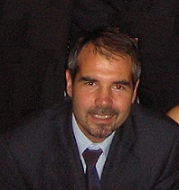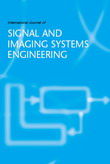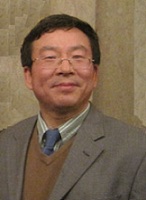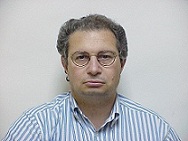
3rd International Conference on Image Processing Theory, Tools and Applications
Confirmed Plenary Speakers:
 Dr. Christian Wolf and Prof. Atilla Baskurt (Presented by Prof. Atilla Baskurt)
Dr. Christian Wolf and Prof. Atilla Baskurt (Presented by Prof. Atilla Baskurt)
Department:
LIRIS laboratory, UMR 5205 CNRS,
INSA Lyon, UCB Lyon 1,
EC Lyon, Univ. Lyon 2
France
Homepage: http://liris.cnrs.fr/atilla.baskurt http://liris.cnrs.fr/christian.wolf
Presentation title: Action recognition in videos
Abstract:
Activity recognition in video sequences is a difficult problem due to the complex characteristics of human articulated motion and its large variations. It requires motion estimation, which involves the separation of motion and visual appearance information, the suppression of irrelevant background clutter and background motion, the separation of motion belonging to different people, and the creation of models describing actions. In this talk we will briefly describe the different frameworks for action recognition, based on background subtraction and on space-time interest points, and we will focus and structured and on semi-structured models. These models attempt to bridge the gap between the rich descriptive power of fully structured models constructed from sets of local features and the convenience and the power of machine learning algorithms, which are mostly based on unstructured features embedded in vector spaces. Semi-structured models proceed by translating structured information into unstructured information, while structured models keep a full representation. As an example we will deal with graphs and graph matching algorithms. Hierarchical representations and parts based models will be investigated, which allow to decompose complex activities into smaller parts of less sophisticated elementary actions or elementary descriptors.
Short Biography:
Christian WOLF received his Master's degree in computer science from Vienna University of Technology in 2000, and the PhD in computer science from the National Institut of Applied Science (INSA de Lyon), France, in 2003. From september 2004 to august 2005 he was assistant professor at the Louis Pasteur University, Strasbourg, and member of the Computer and Image Science and Remote Sensing Laboratory (LSIIT). Since september 2005 he is assistant professor at INSA de Lyon, and member of the Lyon Research Center for Images and Intelligent Information Systems (LIRIS) where he is interested in graphical models for computer vision, in object and activity detection and recognition, generally in contents extraction from multimedia documents.
Pr. A. Baskurt was born in Ankara, Turkey in 1960. He received the B.S. degree in 1984, the M.S. in 1985 and the Ph.D. in 1989, all in electrical engineering from INSA of Lyon, France. From 1989 to 1998, he was “Maître de Conférences” at INSA of Lyon. Since 1998, he is Professor in Electrical and Computer Engineering, first at the University Claude Bernard of Lyon, and now at INSA of Lyon. Between 2003 and march 2008, he was the Director of the Telecommunication Department of INSA. During 2008, he was the Deputy Director of the research center LIRIS. Between septembre 2006 and december 2008, he was “Chargé de mission” on Information and Communication Technologies (ICT) at the French Research Ministry. Pr. A. Baskurt leads his research activities in two teams of LIRIS: the IMAGINE team and the M2DisCo team. These teams work on image and 3D data analysis and segmentation for image compression, image retrieval, shape detection and identification. His technical research and experience include digital image processing, 2D-3D data analysis, compression, retrieval and watermarking, especially for multimedia applications.
Department:
Centre for Mathematical Imaging Techniques
and Department of Mathematical Sciences
The University of Liverpool,
United Kingdom
Homepage:
http://www.liv.ac.uk/~cmchenke/
Presentation title: Selective Variational Image Segmentation Combined with Registration: models and algorithms
Abstract: Image segmentation is an important task in a number of real life image processing applications. Although edge based models have been in wide use for much longer time, region based models offer more robust methods for many challenging problems. Following the seminal works of Osher-Sethian (1988), Mumford-Shah (1989) and Chan-Vese (2001), more and more image segmentation models are proposed, refined and tested. However almost all these models aim to identify all edges and features in an image and such global models may not be needed in some applications where extraction of an particular feature is intended.
In this talk, I present some new work on local and selective segmentation models and algorithms which have applications in medical imaging. First I review fast algorithms for solving the familiar segmentation models in two and three dimensions. Then I discuss selective segmentation and refined models in 2D where pre-defined geometric constraints guide local segmentation in the spirit of Chan-Vese, and present two generalized models and algorithms in 3D and some numerical experiments to demonstrate the robustness of our new models and algorithms. Finally I discuss the use of image registration methods to obtain geometric constriants or equivalent initial contours towards an automatic segmentation framework. Collaborators related to this work include Noor Badshah (Peshawar, Pakistan), Jian-ping Zhang and Bo Yu (Dalian, China), Lavdie Rada (Liverpool), Noppadol Chumchob (Silpakorn, Thailand).
Short Biography:
Ke Chen is a full professor of Mathematical Sciences at the University of Liverpool and director of Centre for Mathematical Imaging Techniques in the Department of Mathematical Sciences. His topics of interest include image analysis and fast algorithms, image restoration, inpainting, segmentation and registration, as well as blind deconvolution, with long standing interest and expertise in developing effective algorithms for numerical PDEs and optimization. He is the author and co-author of more than 100 papers in international journals, conference proceedings, book chapters, in addition to being an author of 3 books. He has successfully supervised 10 PhD students and is currently supervising 5 PhDs. He is on the editorial boards of 5 international journals including Numerical Algorithms (Springer) and has served on many program committees including editor-in-chief for international conference for Computational Mathematics, Computational Geometry and Statistics (CMCGS 2012 and 2013). He is a member of UK EPSRC research council’s peer review college. Educated in Dalian University of Technology, China (BSc), University of Manchester, UK (MSc) , University of Plymouth, UK (PhD) and University of Reading, UK (post-doc), he held visiting professorships in Dalian University of Technology and Chinese University of Hong Kong.
Department:
Chalkis Institute of Technology, Dept. Automation, Psachna Evoias, 34400, Evoia,
Greece
Homepage:
https://dimitrioskarras.myopenid.com/
Presentation title: A Computional Intelligence Framework for NMR Spectroscopy Imaging and Retrieval.
Key words: NMR Medical Signal Processing, NMR Medical Images, MRS signal processing, MRSI Image Retrieval, Fuzzy Descriptors, Dynamical Systems, Nonlinear Systems, Global Optimization, Genetic Algorihtms.
Abstract:
Magnetic resonance spectroscopic imaging (MRSI) combines quantitation of MRS signals and imaging algorithms in order to obtain spatially localized MRS spectra corresponding to a unique clinical subject. MRSI is a relatively new imaging modality for clinical applications compared to MRS spectroscopy quantitation methodologies. Both are related to NMR scanners and spectroscopy. The goal of this plenary talk will be to present a computational intelligent framework for processing such complex spectra modalities towards designing an efficient CBIR system for NMR potential clinical applications. These methodologies will be based on Nonlinear Signal Processing techniques including Dynamical Systems Analysis, Global Optimization methods including Genetic Algorithms as well as on Fuzzy Systems Theory involving development and evaluation of suitable complex Fuzzy Descriptors. A series of experiments illustrate the feasibility and potential of the proposed approaches using synthetic images and model MRS signals derived from benchmark MRS spectra, towards successful NMR spectra retrieval in clinical applications.
Short Biography:
Dimitrios A. Karras received his Diploma and M.Sc. Degree in Electrical and Electronic Engineering from the National Technical University of Athens, Greece in 1985 and the Ph. Degree in Electrical Engineering, from the National Technical University of Athens, Greece in 1995, with honours. From 1990 and up to 2004 he has collaborated as visiting professor and researcher with several universities and research institutes in Greece. Since 2004, after his election, he has been with the Chalkis Institute of Technology, Automation Dept., Greece as associate professor in Digital Systems and Signal Processing as well as with the Hellenic Open University, Dept. Informatics as a visiting professor in Communication Systems (since 2002 and up to 2010). Moreover, he serves as industry consultant in information and automation systems and their applications. He has published more than 50 research refereed journal papers in various areas of pattern recognition, image/signal processing and neural networks as well as in bioinformatics and more than 150 research papers in International refereed scientific Conferences. His research interests span the fields of pattern recognition and neural networks, image and signal processing, image and signal systems, biomedical systems, communications, networking and security. He has served as program committee member in many international conferences, as well as program chair and general chair in several international workshops and conferences in the fields of signal, image and automation systems. He is, also, editor in chief of the International Journal in Signal and Imaging Systems Engineering (IJSISE), topics editor in chief of the International Journal of Digital Content Technology and its Applications (JDCTA) as well as associate editor in various scientific journals. He has been cited by other researchers in more than 400 research papers, his h-index is 10 and his Erdos number is 5.




